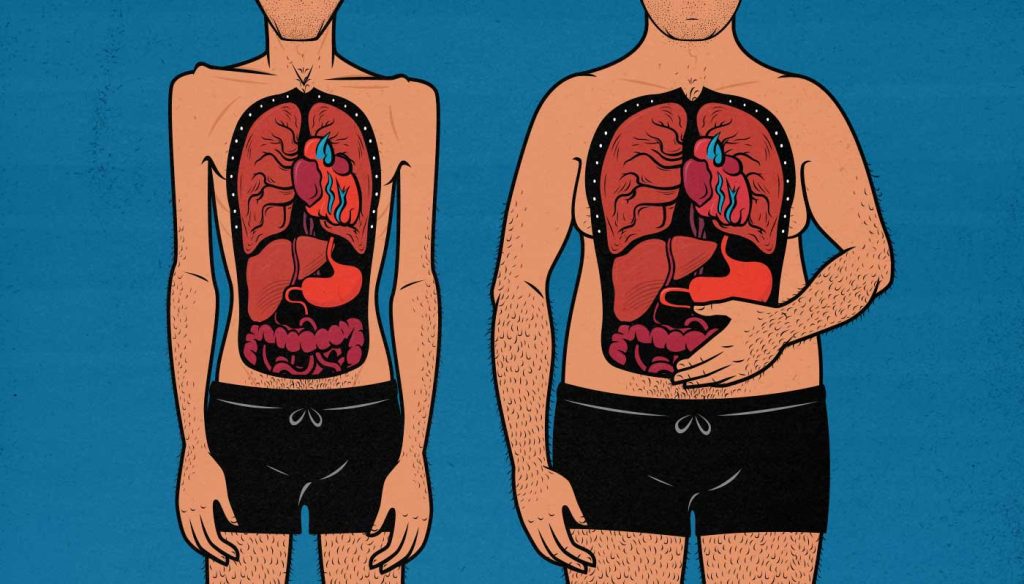
Hardgainers: Why Is It So Hard for Skinny Guys to Gain Weight?
It’s common for skinny “hardgainers” to have trouble gaining weight. We’re in the midst of an obesity epidemic, surrounded by people who gain weight by accident, and yet no matter what we do, we can’t budge the scale.
“Just eat more.” I know. I’ve heard it, too. That advice isn’t wrong, but it’s hard to eat more when we’re fighting against faster metabolisms, smaller stomachs, and humbler appetites. Sometimes when we eat more food, our metabolisms get faster, gobbling up the extra calories, preventing us from gaining weight. We’ll explain all of that.
There are proven methods that can help us gain weight. We’ve helped tens of thousands of skinny guys bulk up. We’ve done it ourselves. We’ll teach you how to do it, too.
There are advantages to being a hardgainer. Once you learn how to take advantage of your body type, you may be able to build muscle faster and more leanly than the average person.
- Video Version
- What’s A Hardgainer?
- Hardgainer Terminology
- Hardgainers Can Often Build Muscle Quite Fast
- Why is It So Hard for Skinny Guys to Gain Weight?
- Some People Lose Their Appetites When Stressed
- Is It Impossible for Hardgainers to Gain Weight?
- How Hard is it to Maintain Muscle Gains?
- You Won’t Be Skinny Forever
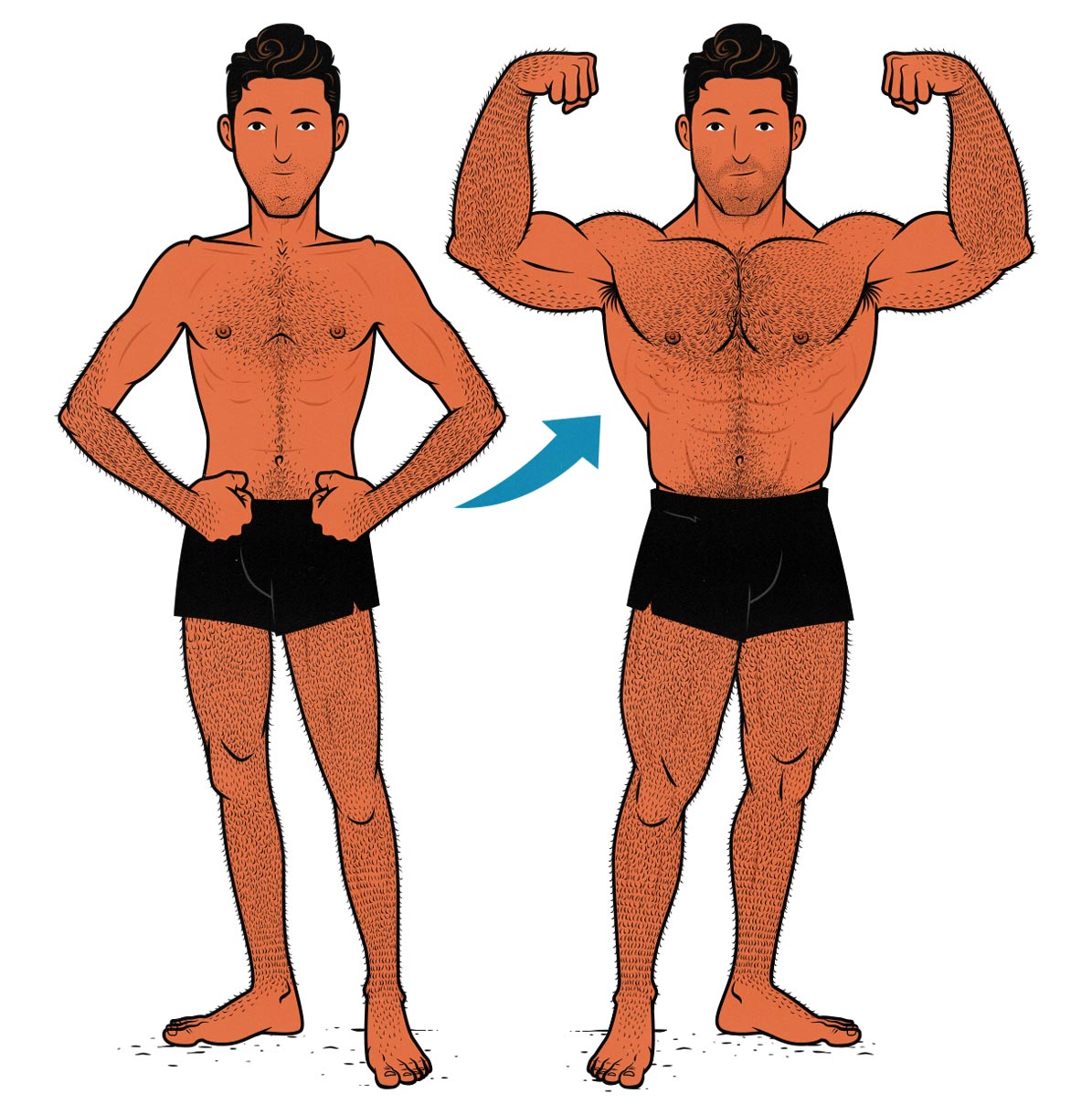
Video Version
If you’d rather watch than read, I made a video about how skinny people can have much faster metabolisms. It includes most of the details in the article, including a breakdown of the research, and also giving advice on what to do about it.
The video focuses on metabolism, but it’s also common for skinny guys to have smaller stomachs and more meagre appetites. If that sounds like you, I recommend reading some of the sections below.
What’s A Hardgainer?
A hardgainer is someone who has trouble gaining weight. It applies to people who have trouble gaining fat, but it’s more commonly used to describe skinny guys who struggle to bulk up.
Hardgainers do exist. It’s well-documented that some people have a harder time gaining weight than others. Here’s a quote about Dr. Ethan Sims, a famous researcher who conducted several overfeeding studies in the 70s (study, study):
One of his volunteers, for example, began at 132 pounds. He struggled resolutely for more than thirty weeks to gain weight, ate great amounts of food, and reduced his activity to less than half its former level, but was never able to push above 144 pounds. He simply didn’t have the willpower to get fat.
Ethan A. H. Sims, MD
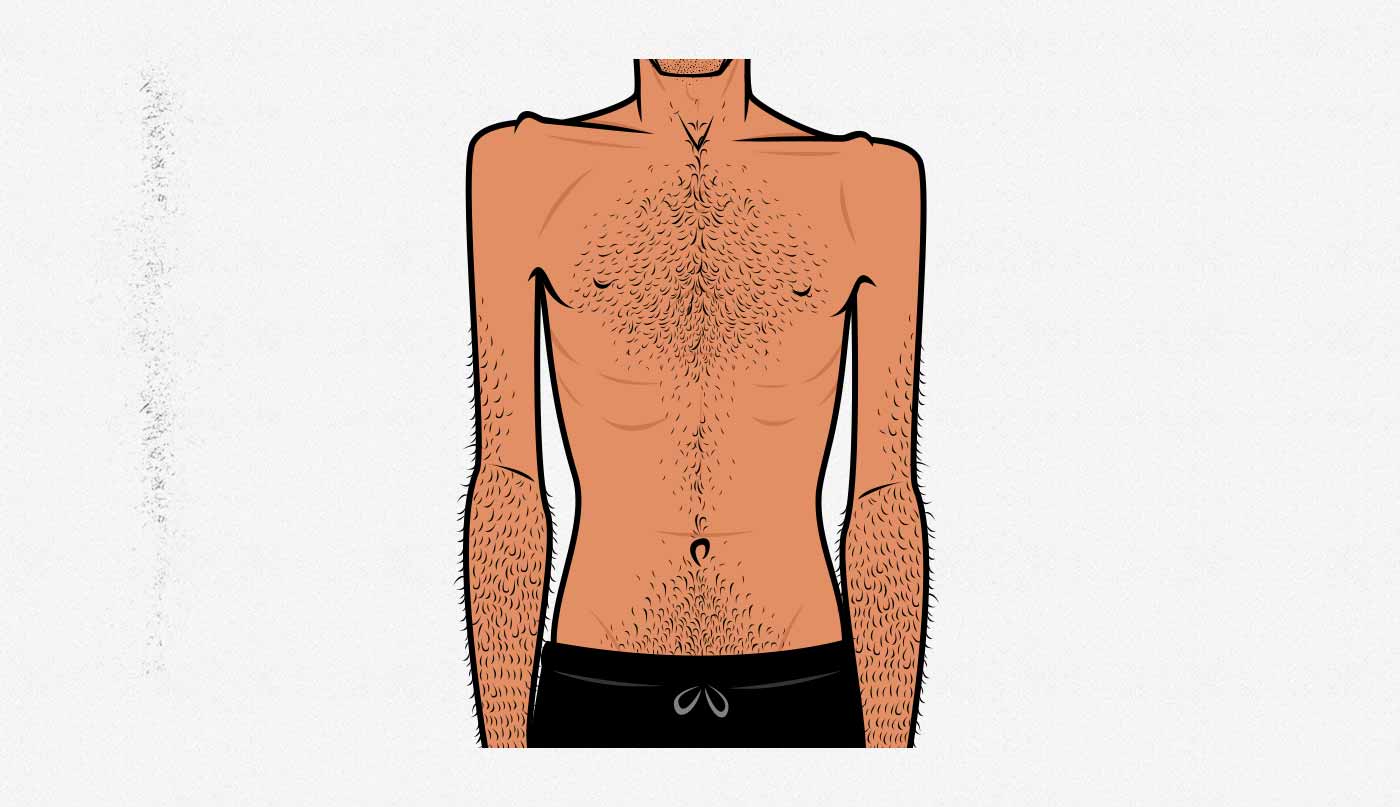
Hardgainer Terminology
“Hardgainer” is often used interchangeably with other terms that describe skinny guys. Before we delve deeper, let’s get our terminology straight:
- Hardgainer: someone who has a hard time gaining weight. Not every hardgainer is naturally skinny or has a thin bone structure, but many do.
- Skinny: someone with less muscle and fat than average. We often build muscle quite fast. We can often bulk quite aggressively.
- Skinny-fat: someone with less muscle than average but too much body fat. For example, someone with upper arms smaller than 13 inches and a body-fat percentage over 20%. It’s another way of calling someone “out of shape.” Skinny-fat guys often benefit from doing a lean bulk.
- Ectomorph: someone with a thin bone structure. However, not every ectomorph has trouble gaining weight. Note that “ectomorph” isn’t a scientific term. In fact, it’s rooted in psychological pseudoscience. Nowadays, it’s just bodybuilding slang for someone with a narrower frame.
- Low-responder (formerly non-responder): someone who has trouble stimulating muscle growth. They can still build muscle; it’s just harder and takes longer. That’s why the correct term is “low-responder” instead of “non-responder.” Fortunately, this has nothing to do with being skinny. Most skinny guys have a robust response to resistance training.
These terms all mean different things, but they often overlap. For example, a guy with a thinner body type (an “ectomorph”) might have trouble gaining weight, making him a hardgainer. Failing to gain weight prevents him from building muscle, keeping him skinny, and making him seem like a low-responder.
Hardgainers Can Often Build Muscle Quite Fast
We’ve coached over 10,000 naturally skinny guys through this. Marco has worked with clients ranging from deskworkers to professional and Olympic athletes. We can all build muscle just fine. Here are more client examples.
If you can overcome your smaller stomach and faster metabolism, you can gain weight. Once you start gaining weight, all your muscle-building problems disappear. In fact, we’ve noticed something strange. Skinny guys seem to be able to build muscle faster than average. I’ve spoken with hypertrophy researchers about this. Almost everyone has noticed it, but nobody can say for certain why.
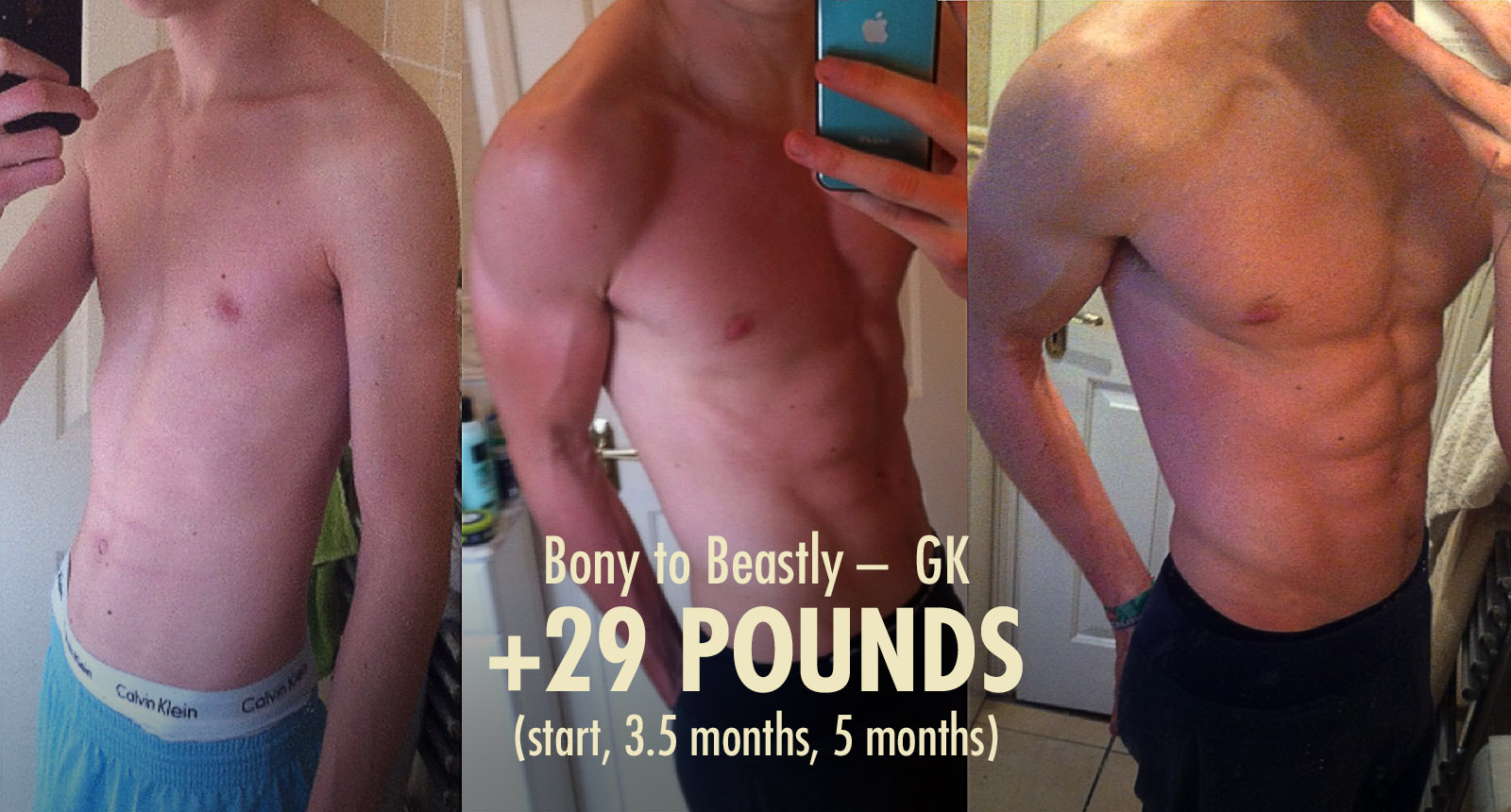
My thinking is that our potential rate of muscle growth is proportional to how much room we have on our frames. Skinny guys are starting with less muscle than average. Their frames have plenty of room for growth. Their frames are eager for growth. And so we build muscle quite quickly and leanly.
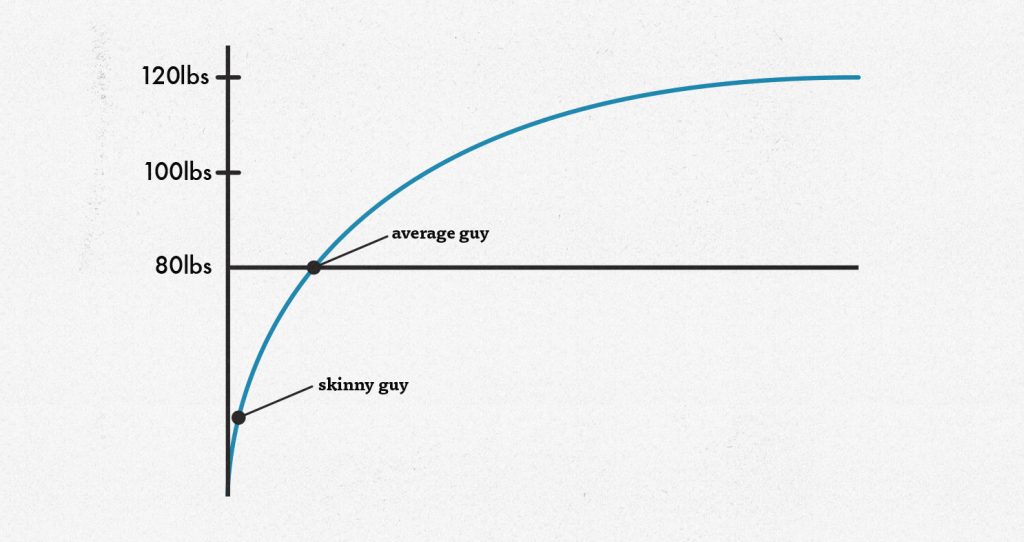
For instance, the average man starts off with around eighty pounds of muscle mass on his frame (source). A skinny guy might start off with half that. However, our frames can hold similar amounts of muscle (give or take 10%), meaning we’re starting off much further away from our genetic potential. This allows us to get explosive muscle growth when we first start bulking up. We fill out quickly.
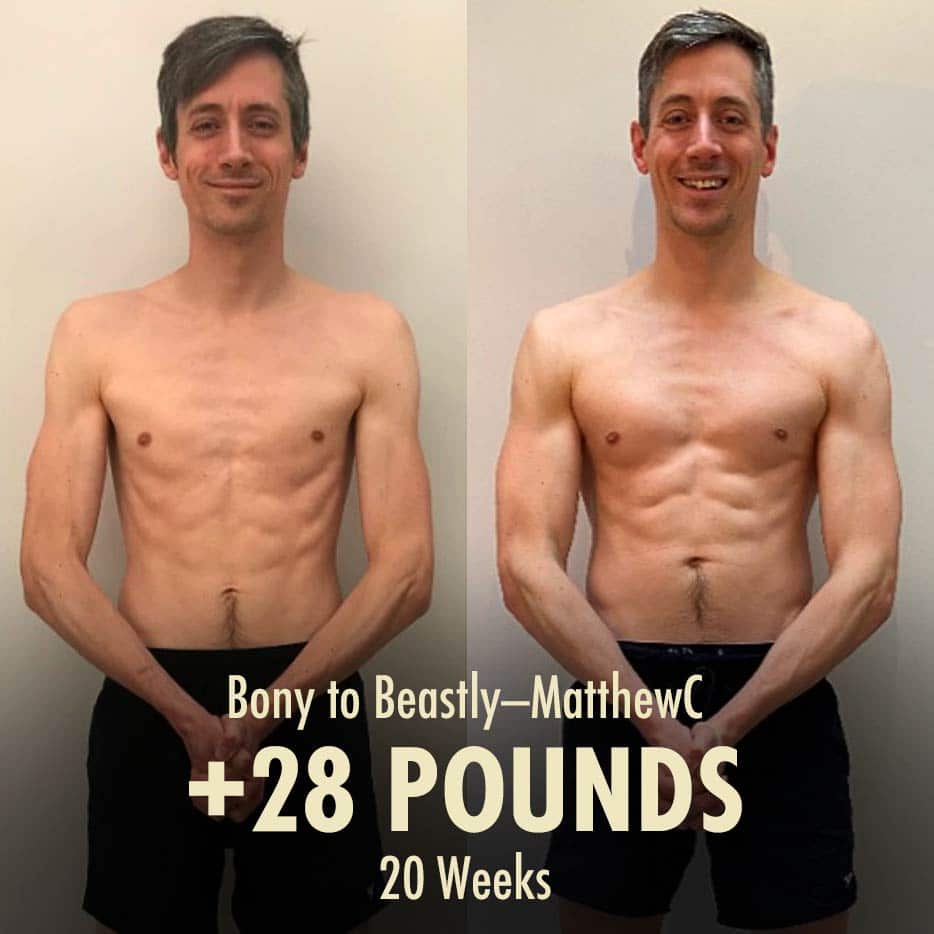
This period of rapid growth when people first start lifting weights is often called “newbie gains.” Almost everyone experiences newbie gains. Skinny guys seem to experience an extra, more extreme muscle growth phase. We get pre-newbie gains before our newbie gains.
Bulking as a skinny hardgainer requires a different approach. The problem is, it’s a rare problem, so it’s hard to find a diet designed specifically for skinny guys. Overweight people have intermittent fasting, keto, low-carb diets, paleo, and a dozen other diets. Where’s ours?
Why is It So Hard for Skinny Guys to Gain Weight?
Why do we struggle to gain weight? I’ve asked dozens of experts, including the leading weight gain researcher, Dr. Stephan Guyenet. He told me that most people are genetically primed to overeat when an abundance of delicious food is available. Some people more than others.
Skinny guys have different variants of those same genes. Our cravings aren’t quite as intense. We feel full faster. We stay full longer. We burn more calories.
These aren’t genetic disadvantages. In fact, in the modern environment, most people consider them genetic advantages. It’s harder to bulk up, yes, but we can overcome that limitation. But before discussing solutions, let’s delve deeper into our genetics.
Hardgainers are Designed to Burn Calories
According to the Smithsonian, there’s an evolutionary reason why some people burn more calories. If you’re trying to run a marathon across the plains of Africa, having a thinner build helps quite a lot. If you watch the summer Olympics, this will come as no surprise. Kenyans with thinner, narrower frames dominate long-distance races.
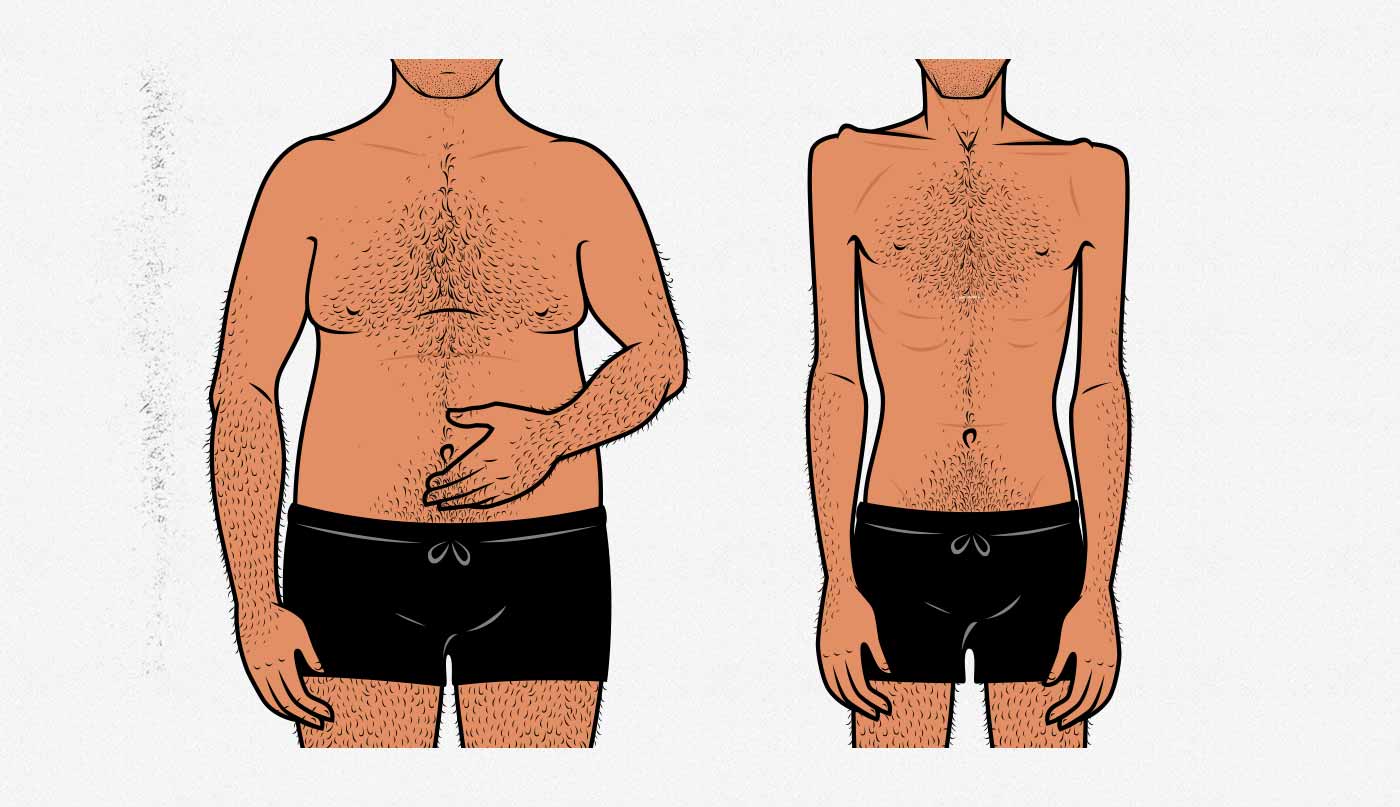
People with thin builds evolved to be good at travelling long distances in hot climates, radiating their energy outwards to avoid overheating. To do this, we evolved smaller stomachs, faster metabolisms, lighter bones, longer limbs, and less body fat to insulate us.
Populations that evolved in Northern climates, such as the Inuit, tend to be shorter and thicker. The Smithsonian argues that their stockier builds are better at conserving heat and calories, making them great at surviving harsh arctic winters.
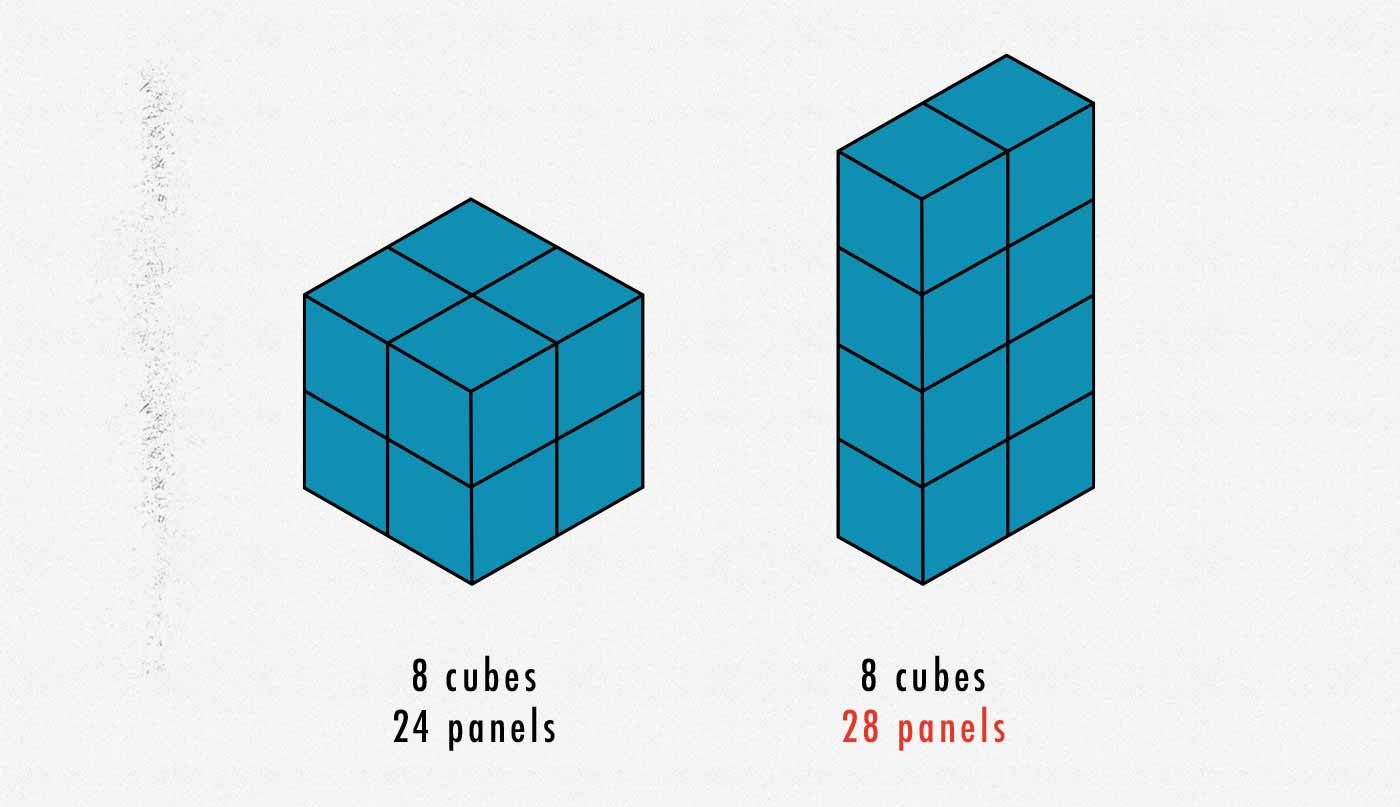
To understand this, we need to understand Allen’s Rule. Lankier body shapes have a greater surface area, causing them to radiate more heat outwards. And then, of course, having less fat means less insulation, causing us to lose even more energy as body heat.
Being hardgainers doesn’t mean there’s anything wrong with us. We’ve just got genetics that are helpful in slightly different circumstances. For instance, we’re good at keeping cool while running long distances in the hot sun.
Skinny Guys Often Have Smaller Stomachs
Stomachs come in different sizes. In his famous 1945 study, AJ Cox found that the size of the human stomach varies by up to 600% between individuals. In fact, according to Cunningham’s Textbook of Anatomy, “no organ in the body varies more in size than the stomach.” This means that another guy the same height as you may have a stomach six times as large.
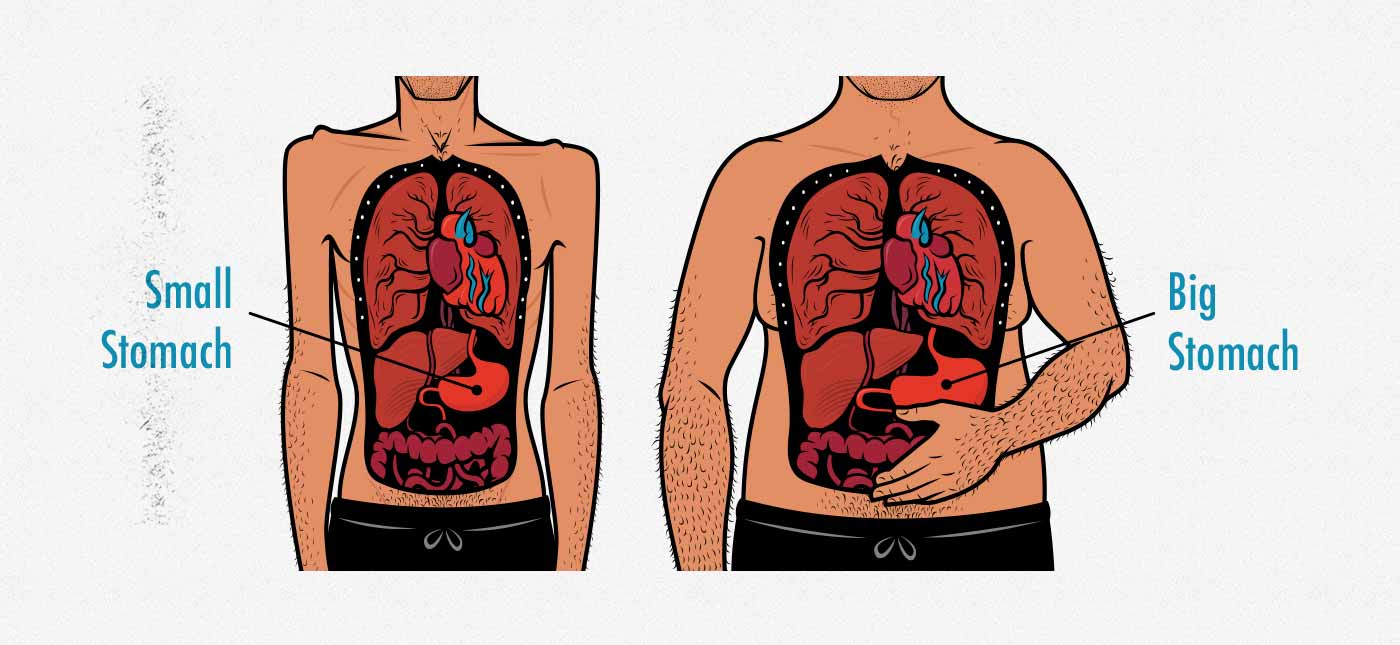
It’s easy to imagine how having a smaller stomach could make it harder to gain weight. It’s borne out in the research, too. The smaller someone’s stomach is, the fewer calories they can consume per meal, and the less they’re likely to weigh (study).
What’s interesting, though, is that, unlike our bone structure, we have some control over our stomach size. In a third study, researchers had one group eat their normal diet, whereas they gave the other group smaller meals. Four weeks later, the stomachs of the people eating smaller meals shrunk by up to 36%.
By gradually eating larger and larger meals, we can increase our stomach size. I’ve noticed this. As I gradually gained 70 pounds, my stomach grew steadily bigger, keeping pace with me. I can comfortably eat much larger meals than I could before.
That doesn’t help us when we first start bulking, though. So in the meantime, there are a few strategies we can use to eat more calories more easily. The simplest trick is to keep your meals the same size or perhaps slightly bigger. Get your extra calories from snacks instead.
Hardgainers Have Faster Metabolisms
Many skinny guys feel like caloric pits leading straight to a fiery inferno. No matter how much food we shovel into our mouths, our weight refuses to budge on the scale. Why is that? Are our metabolisms really that much higher?
Some experts argue we’re just underestimating how much we eat, and that can certainly happen. Some people crave food more than others. Some people feel full more easily than others. Even if we feel like we’re eating a lot, sometimes we aren’t.
But thinner bodies aren’t as calorically efficient. As we covered earlier, we have greater surface areas and less insulation, causing us to lose more energy as heat. That isn’t always a large effect, but it’s an effect nonetheless.
It gets far more interesting than that, though. Researchers have been conducting overfeeding studies for a long time, trying to study either starvation or obesity. They found an interesting phenomenon occurring in a small portion of the population. These are the studies that birthed the term “hardgainer.”
The Mystery of the Disappearing Calories
In this study, the participants were overfed by a thousand calories every day for eight weeks straight. By the end of the study, most people had gained quite a bit of fat, with one guy gaining a whopping 9.3 pounds. That’s exactly what the researchers expected: if you overeat, you gain weight.
However, some participants hardly gained any weight, with one guy gaining a mere 0.79 pounds. The researchers had no idea where all the extra calories were going. They named these strange outliers: hardgainers.
The hardgainer phenomenon remained a mystery until researchers discovered we burn extra calories through subconscious activity, such as fidgeting (study). This became known as non-exercise activity thermogenesis (NEAT), which can greatly impact our metabolisms. Hardgainers burn 50% more calories than average while sitting. When they stand up, they burn 80% more calories (study).
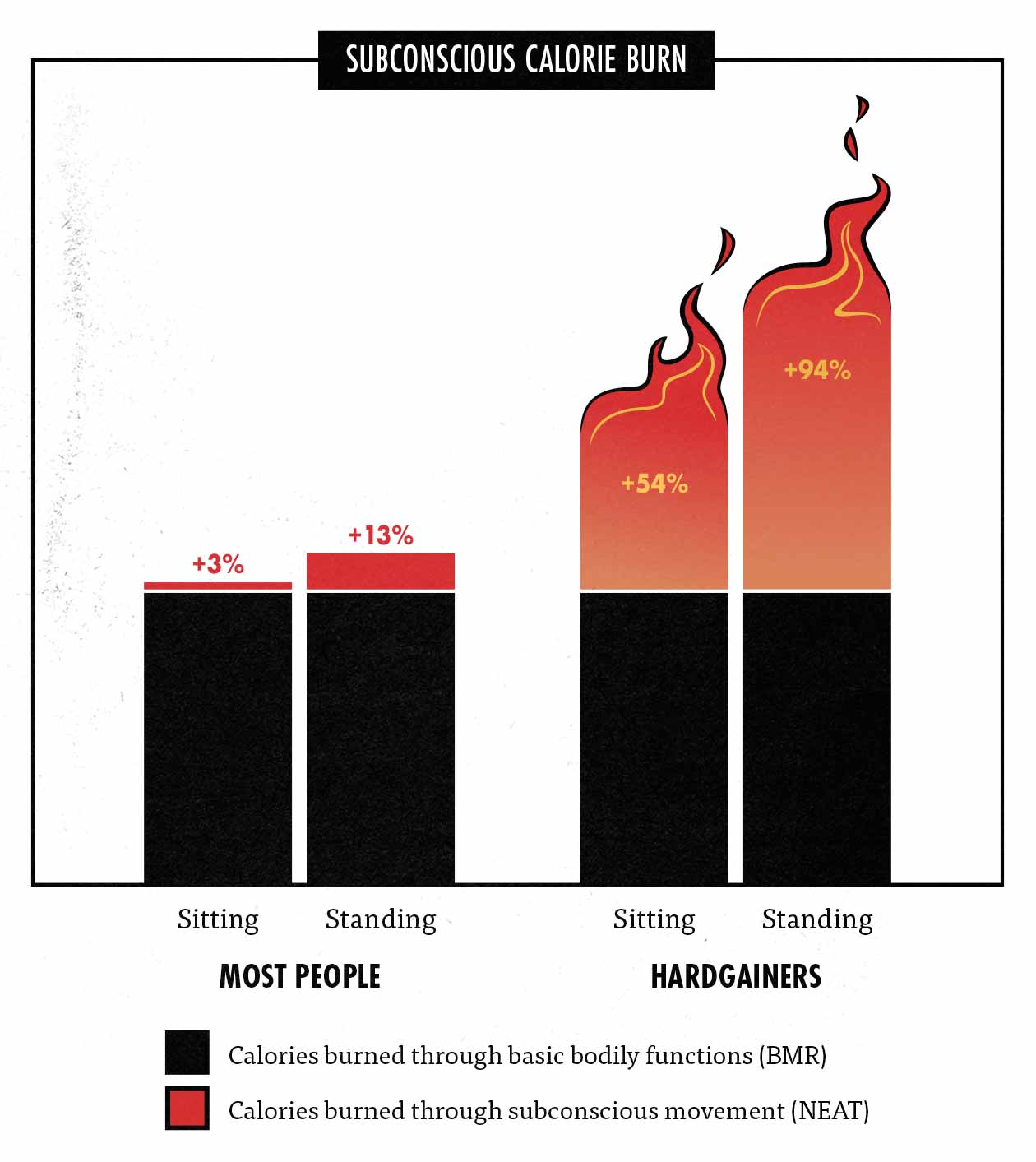
Depending on how much of your time you spend sitting and standing, you burn around 600–950 calories every day. That’s not even the whole story. Hardgainers also tend to spend about two extra hours on their feet each day (study), burning another 350 extra calories. Combine these two facts together, and it explains how that one guy made his thousand-calorie surplus disappear.
To put this into perspective, the average guy might be able to maintain his weight by eating 13x his body weight (in pounds) in calories each day. If he weighs 150 pounds, that means eating about 2,000 calories per day. If he eats more than that, he may start gaining fat.
A hardgainer, on the other hand, might be able to eat 22x their body weight each day without gaining any fat. For someone who weighs 150 pounds, that’s 3,300 calories per day. That’s a big difference, especially considering our higher insulin sensitivity and smaller stomachs.
However, note that hardgainers can maintain their weight on both caloric intakes. If a 150-pound hardgainer eats 2,000 calories per day, his metabolism will slow to match his new intake. His weight will stay the same. If he starts eating 3,300 calories, you’d expect him to gain weight, but he may not. He may just spend more time standing, pacing around, and fidgeting.
This sounds like a disadvantage, but it might not be. It seems that we build muscle before we fidget away the surplus. If we’re working out and eating a good bulking diet, this tends to help us build muscle leanly. It doesn’t get in our way. Plus, being more active is quite healthy. I think this is one of our great genetic strengths.
Some People Lose Their Appetites When Stressed
Stress affects appetite. For most people, stress increases appetite. The more stressed they get, the more they eat. They drown their worries in ice cream. But that isn’t true of everyone. A small subset of people lose their appetite when overly stressed (study, study).
Stress usually isn’t bad. Think of how the stress of lifting weights provokes muscle growth, causing us to grow bigger, stronger, and more robust. This isn’t unique to lifting weights or exercising. During stressful situations, we produce energizing hormones (such as adrenaline and cortisol) to help us solve our problems. Afterwards, we go into recovery mode, producing hormones that help us adapt (such as DHEA).
Many different types of physiological and psychological stress provoke positive adaptations. We just need to make sure we recover from them. Those periods of recovery are when we relax, rest, and eat.
A healthy lifestyle will help you adapt to stressors. Here are a few foundational principles of stress management:
- Hypertrophy training: several studies show that weight training helps manage stress. Interestingly, training in moderate rep ranges (of around twelve reps per set) seems to have the biggest stress-reduction effect. That’s the rep range used in hypertrophy training programs, which is a fortunate coincidence (systematic review).
- Cardio and physical activity: the next way to manage stress is to be active (study). It doesn’t need to be anything crazy. Cardio can be as simple as going on a brisk 20-minute walk every morning.
- Getting enough good sleep: when we don’t get enough sleep, we produce more cortisol to keep our energy levels high (study). By getting more sleep, we produce fewer stress hormones and more recovery hormones. The benefits are profound. One study found 30% faster muscle growth (study).
All of these lifestyle changes synergize, too. Lifting weights and exercising give us better sleep. Going on morning walks improves sleep and digestion. Getting a good night’s rest gives us more energy to work out and exercise, improving our training. And as our health and fitness improve, we become even better at managing stress. The benefits compound.
Is It Impossible for Hardgainers to Gain Weight?
It’s not impossible for a hardgainer to gain weight. It’s just harder. We need a little finesse, especially because we aren’t just trying to gain weight; we’re trying to build muscle.
The first step is to lift weights. There are a few different ways of lifting weights, ranging from cardio-oriented programs like CrossFit to strength-oriented programs like Starting Strength and StrongLifts 5×5. These are good programs, but they aren’t designed to stimulate a maximal amount of muscle growth. For that, we need hypertrophy training.
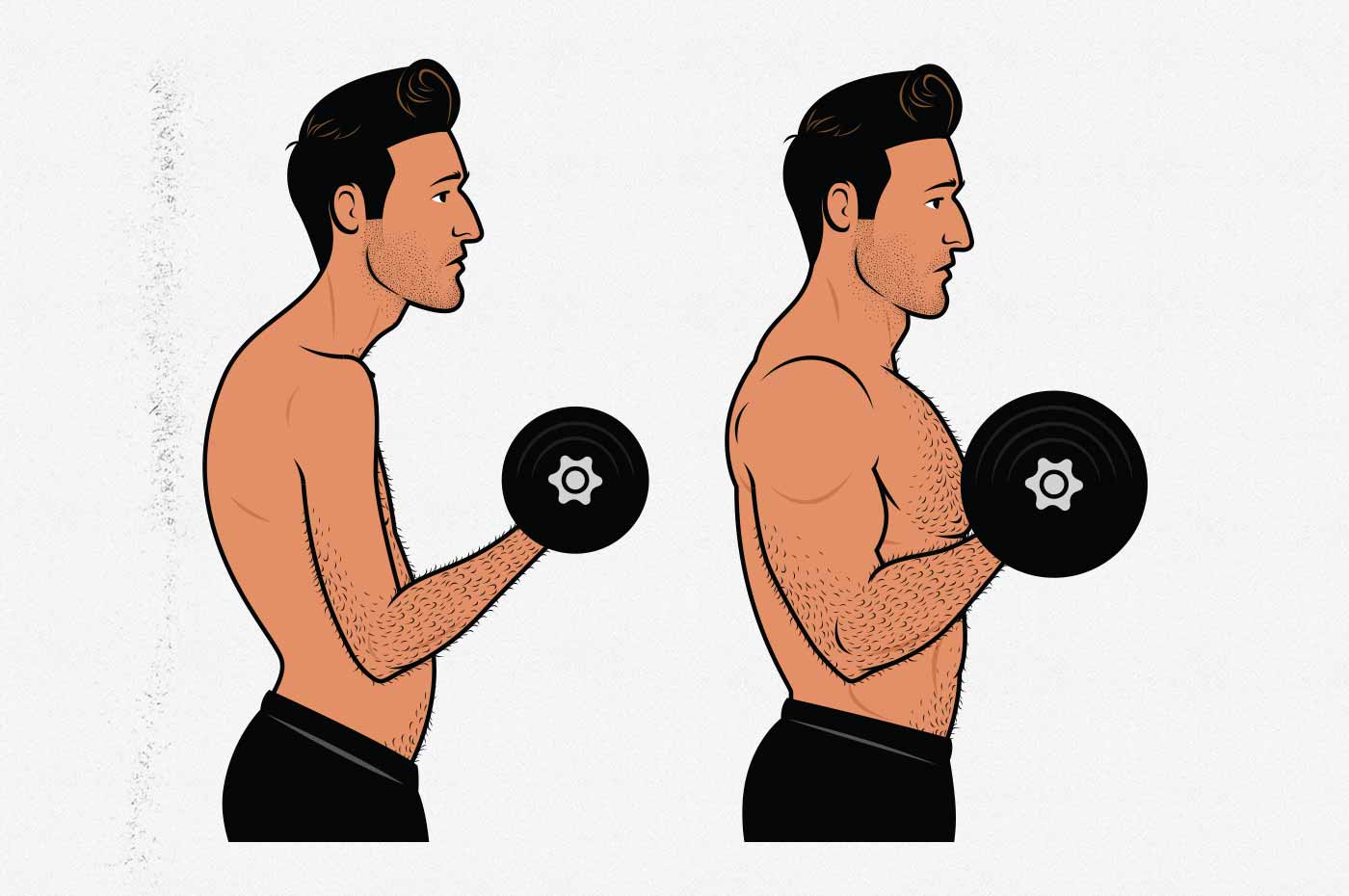
The next step is to eat an abundant bulking diet. Not a mainstream fat-loss diet. Not keto or intermittent fasting or anything like that. We need to pile our plates high with lean meats, seafood, Greek yogurt, fruits, berries, potatoes, whole grains, nuts, seeds, legumes, vegetables, dark chocolate, and honey. Don’t think about cutting back on bad foods; think about filling your diet with good foods. Blend up bulking smoothies, cook up big pots of chili, and fill your cupboards with trail mix.
Being a hardgainer causes us to burn off unneeded calories. If we’re stimulating enough muscle growth with our workout routines, then the extra calories we’re eating are no longer unneeded. Calories that need to be invested in building bigger biceps aren’t extra calories.
It gets better, too. If our training makes our bodies desperate enough to build muscle, our appetites often increase. After all, our appetite is designed to prevent haphazard weight gain, not to prevent necessary adaptations. If we signal to our bodies that building muscle is a high priority, our appetites will often rise accordingly.
How Hard is it to Maintain Muscle Gains?
I used to worry that even if I could build muscle, at some point, I’d surely get sick, stressed or busy and lose everything. I worried that as soon as I stopped forcing myself to eat more, my muscles would shrivel up and fall off. It’s a common fear. No hardgainer wants to spend the rest of his life perpetually fighting to eat more calories.
I was wrong. Muscle is easy to maintain. A pound of muscle burns six calories per day at rest, and more like 10–12 calories after factoring in the energy it takes to haul around the extra weight (article). If you gain 20 pounds of muscle, you’ll burn around 220 more calories per day. That might sound like a problem, but your stomach and appetite will grow along with you.
When we stop bulking, we can maintain our muscle mass with a much lower protein intake. We can think about eating balanced, healthy meals. A balanced meal has protein in it. But we don’t need to eat like bodybuilders, carrying around boiled eggs and mixing whey into everything.
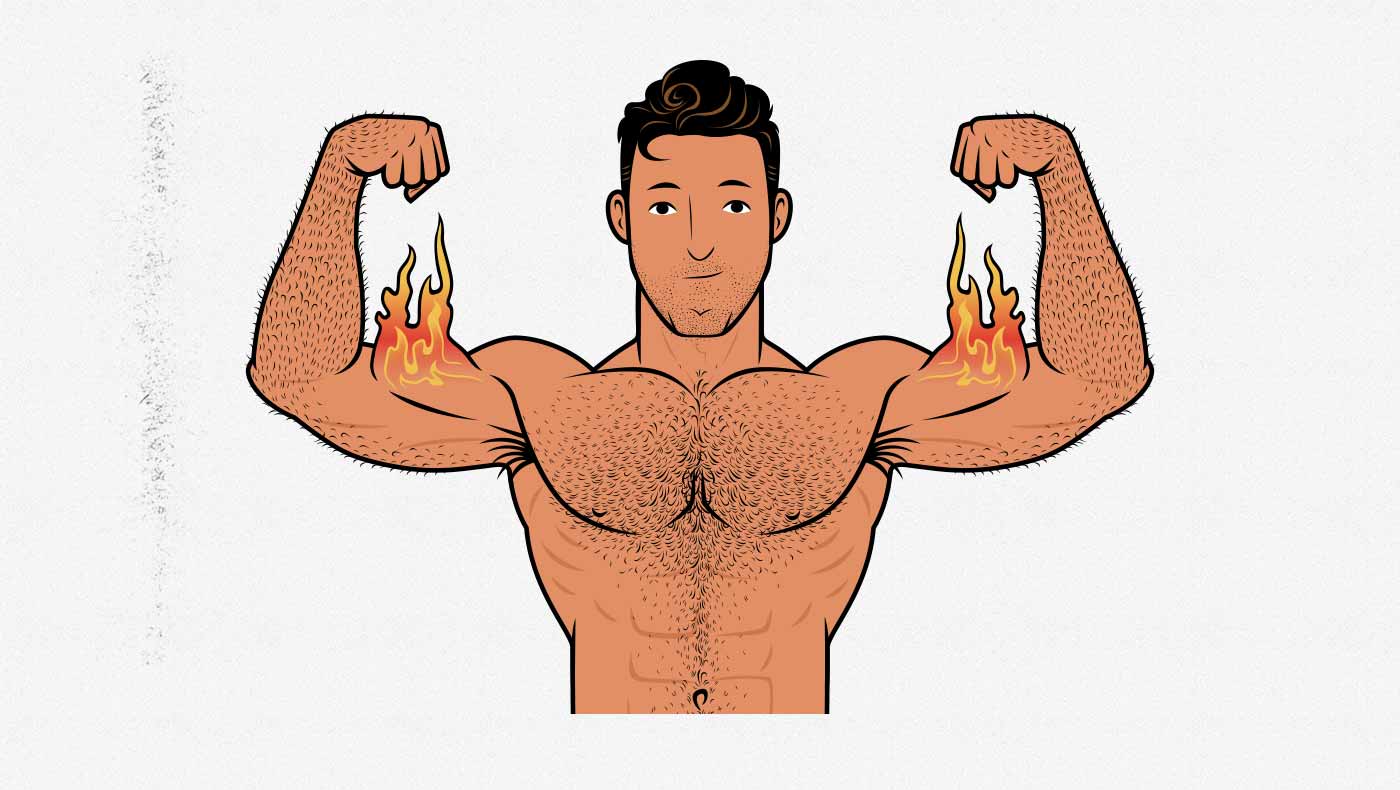
Moreover, many of the changes in our muscle fibres are permanent. The glycogen we store in our muscles can fluctuate depending on how many calories and carbs we eat, causing us to deflate and inflate a little bit. Still, the extra nuclei we add to our muscle fibres will stay there for the rest of our lives—even during periods of starvation.
If you want to maintain your gains after bulking, we recommend Reverse Bulking. But whether you use that method or not, once you build muscle, it’s easy to stay muscular forever.
You Won’t Be Skinny Forever
If you learn how to eat more food, you can gain weight. If you gain weight, it’s fairly easy to maintain those gains. Many muscle-building adaptations are permanent.
Still, if you tend to undereat, that tendency may stay with you forever. I’ve been eating a bigger diet for ten years, maintained a 70-pound gain, and helped thousands of other skinny guys bulk up. I still undereat when I get tired, busy, or stressed. That’s just how I am.
You won’t be skinny forever. You can accomplish all of your goals. But you probably won’t ever need to stress about overeating, becoming overweight, or watching what you eat. Those aren’t our struggles. We’ve got better ones.
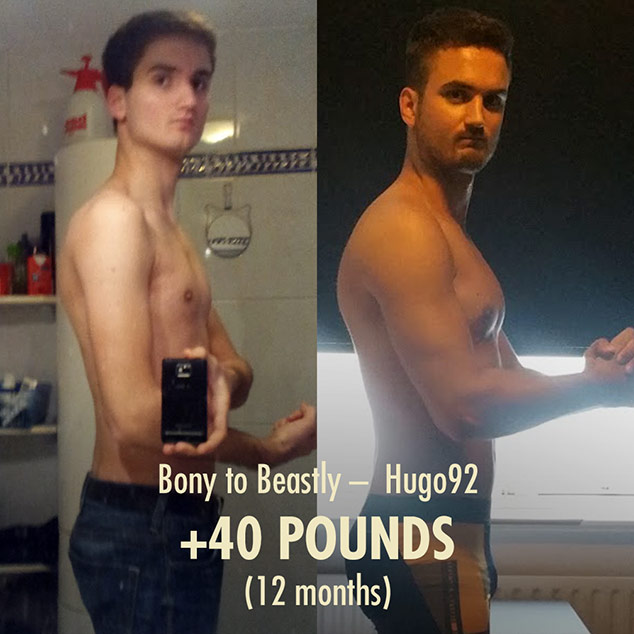
Alright, that’s it for now. For more, we have a free muscle-building newsletter for naturally thin guys. If you want a full foundational bulking program, including a 5-month full-body workout routine, diet guide, recipe book, and online coaching, check out our Bony to Beastly Bulking Program. Or, if you want a customizable intermediate bulking program, check out our Outlift Program.

